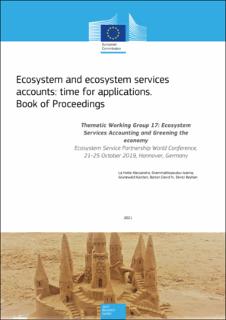Ecosystem and ecosystem services accounts: time for applications.Book of Proceedings. Thematic Working Group 17: Ecosystem Services Accounting and Greening the economy. Ecosystem Service Partnership World Conference, 21-25 October 2019, Hannover, Germany
La Notte, Alessandra; Grammatikopoulou, Ioanna; Grunewald, Karsten; Barton, David Nicholas; Beyhan, Ekinci
Research report
Published version

Åpne
Permanent lenke
https://hdl.handle.net/11250/3055456Utgivelsesdato
2021Metadata
Vis full innførselSamlinger
- Eksterne rapporter [13]
- Publikasjoner fra CRIStin - NINA [2364]
Sammendrag
This report outlines the ecosystem accounting applications that have been presented in the Ecosystem Services World Conference in Hannover, Germany in 2019. Eight cases are summarized here; applications of ecosystem accounts in Europe, Canada, Czech Republic, Germany, Uganda, Bulgaria, Andalusia-Spain and Oslo-Norway. Most of these applications are in line with the System of Integrated Environmental and Economic Accounts (SEEA) framework and the outcomes are regarded as pilot attempts concluding in interesting messages that should be accounted for in next development steps. All cases discuss the compilation process of certain type of ecosystem asset or ecosystem services accounts either at regional, national or local level depicting the methodological process as well as the main outcomes. They also report the policy priorities that these accounts attempted to address and the policy implications that may follow given the accounts’ results. Some of the strong highlights emerged from these cases are summarized as follows: countries should initiate the development of accounts using currently available data and then evolve this attempt based on pilot accounts. It is imperative that collaboration between institutes is ensured as ecosystem accounting is a complex process that demands strong joint forces between different experts as well as stakeholders. Demand for ecosystem accounts should be systematically developed if ecosystem accounting is to be institutionalized. Accounts need to demonstrate clear messages and be linked to certain policy needs even in this primary stage to foster policy support.
